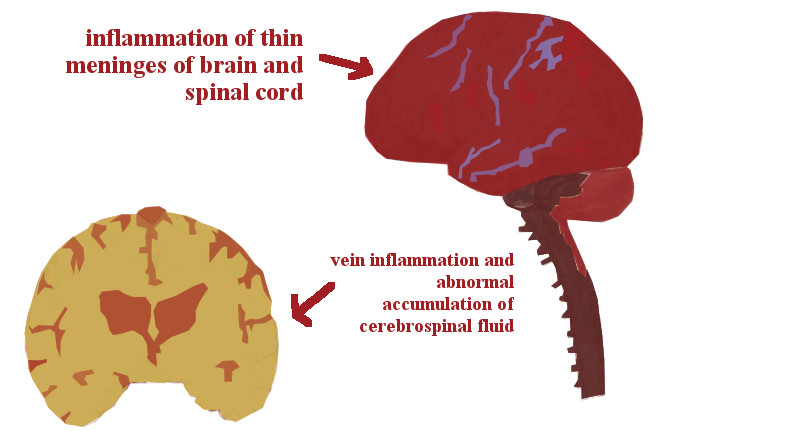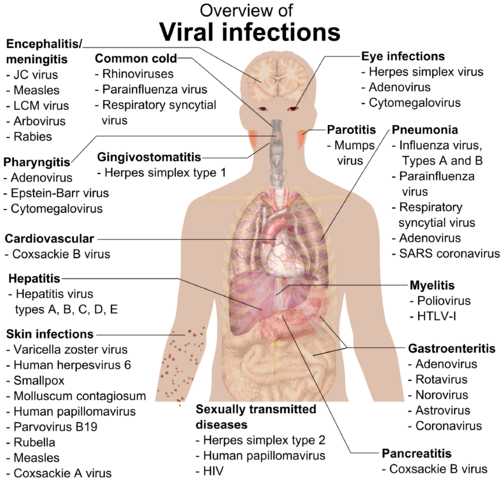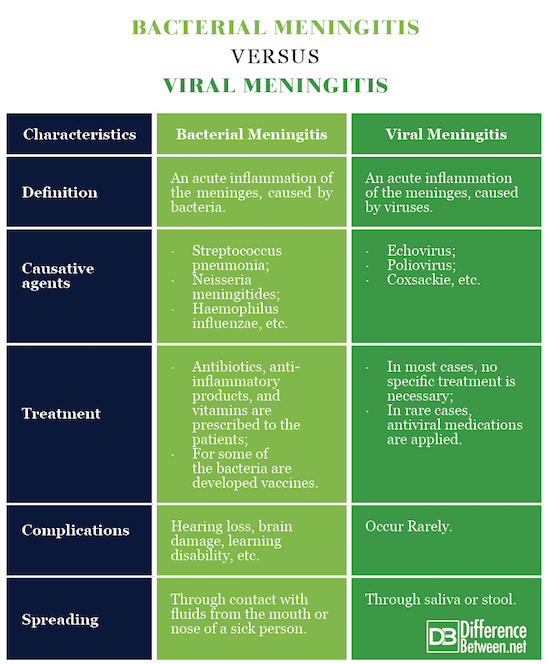Difference Between Bacterial and Viral Meningitis
Meningitis is an acute inflammation of the membranes that cover and protect the brain and the spinal cord. These membranes are called meninges. There are two main types of meningitis, depending on the causative agent – bacterial and viral meningitis.
What is Bacterial Meningitis?
Bacterial meningitis is an acute inflammation of the meninges, caused by bacteria. It can be caused by different bacterial species. Example of such species are Streptococcus pneumonia, Neisseria meningitides, Haemophilus influenzae, etc.
The symptoms of viral and bacterial meningitis are similar and can include:
- Nausea;
- Vomiting;
- Rash;
- Fever;
- Sleepiness;
- Discomfort looking into bright light;
- Severe headache;
- Stiff neck;
- Confusion;
- Irritability, etc.
Bacterial meningitis is a very serious condition, which can result in severe complications, like hearing loss, brain damage, learning disability, etc. Untreated meningitis can be fatal for the patient.
It is important to determine the bacteria, causing meningitis and to start proper treatment as soon as possible, in order to avoid complications.
Bacterial meningitis is treated with antibiotics. Anti-inflammatory products and vitamins are also prescribed to the patients. If necessary analgesics can also be applied.
For some of the causative agents of bacterial meningitis (Streptococcus pneumoniae, Neisseria meningitides, etc.) vaccines are developed.
Bacterial meningitis can be fatal due to late or confused diagnosis, inappropriate treatment, weak immune system, or other accompanying diseases. The increasing adaptation and resistance of the bacteria, causing meningitis to antibiotics is also a serious problem.
Bacterial meningitis spreads from one person to another through contact with fluids from the mouth or nose of a sick person.
What is Viral Meningitis?
Viral meningitis is an acute inflammation of the meninges, caused by viruses.
There are more than 50 types of viruses, causing meningitis. The most common are echovirus, poliovirus, and coxsackie. Most of the viruses, causing meningitis are more common in summer and fall.
The symptoms of viral meningitis are similar to the symptoms of and bacterial meningitis, listed above.
In general, the virus meningitis is less severe than bacterial meningitis. In most cases, no specific treatment is necessary. Most people with viral meningitis recover without special treatment within 7 to 10 days. In some cases, for example, meningitis caused by herpesvirus, antiviral medications are applied.
Complications are rarer in viral meningitis, but they can occur in patients with accompanying diseases or weak immune system. Reason for complication in viral meningitis can be also the neglecting of the disease or late diagnosis.
Viral meningitis can be spread from one person to another through saliva or stool.
Difference Between Bacterial and Viral Meningitis
-
Definition
Bacterial Meningitis: Bacterial meningitis is an acute inflammation of the meninges, caused by bacteria.
Viral Meningitis: Viral meningitis is an acute inflammation of the meninges, caused by viruses.
-
Causative agents
Bacterial Meningitis: Bacterial meningitis can be caused by Streptococcus pneumonia, Neisseria meningitides, Haemophilus influenzae, etc.
Viral Meningitis: More than 50 types of viruses cause meningitis. The most common are echovirus, poliovirus, and coxsackie.
-
Treatment
Bacterial Meningitis: Bacterial meningitis is treated with antibiotics. Anti-inflammatory products and vitamins are also prescribed to the patients. For some of the bacteria, causing meningitis are developed vaccines.
Viral Meningitis: In most cases, no specific treatment is necessary, but in more severe viral meningitis antiviral medications are applied.
-
Complications
Bacterial Meningitis: Bacterial meningitis can result in severe complications, like hearing loss, brain damage, learning disability, etc. Untreated meningitis can be fatal for the patient.
Viral Meningitis: Complications are rare, but can occur in patients with accompanying diseases or weak immune system.
-
Spreading
Bacterial Meningitis: Bacterial meningitis spreads from one person to another through contact with fluids from the mouth or nose of a sick person.
Viral Meningitis: Viral meningitis can be spread from one person to another through saliva or stool.
Comparison Chart for Bacterial and Viral Meningitis
Summary of Bacterial and Viral Meningitis
- Meningitis is an acute inflammation of the membranes that cover and protect the brain and the spinal cord. These membranes are called meninges.
- There are two main types of meningitis, depending on the causative agent – bacterial and viral meningitis.
- Bacterial meningitis is an acute inflammation of the meninges, caused by bacteria. It can be caused by Streptococcus pneumonia, Neisseria meningitides, Haemophilus influenzae, etc.
- Viral meningitis is an acute inflammation of the meninges, caused by viruses. It can be caused by echovirus, poliovirus, coxsackie, etc.
- The symptoms of viral and bacterial meningitis can include nausea, vomiting, rash, fever, sleepiness, discomfort looking into bright light, severe headache, stiff neck, confusion, irritability, etc.
- Bacterial meningitis is treated with antibiotics. Anti-inflammatory products and vitamins are also prescribed to the patients. For some of the bacteria, causing meningitis are developed vaccines.
- In most cases, no specific treatment is necessary for viral meningitis. If necessary, antiviral medications are applied.
- Bacterial meningitis can result in severe complications, like hearing loss, brain damage, learning disability, etc. Untreated meningitis can be fatal for the patient.
- Viral meningitis rarely results in complications. Such can occur in patients with accompanying diseases or weak immune system.
- Bacterial meningitis spreads from one person to another through contact with fluids from the mouth or nose of a sick person. Viral meningitis can be spread from one person to another through saliva or stool.
- Difference Between Gallstones and Cholecystitis - September 5, 2021
- Difference Between Constipation and Cramping - August 4, 2021
- Difference Between Whole Genome Sequencing and Microarray - May 6, 2021
Search DifferenceBetween.net :
Leave a Response
References :
[0]Bhardwaj, A., M. Mirski (Eds.). Handbook of Neurocritical Care. New York: Springer. 2010. Print.
[1]Rotbart, H. Human Enterovirus Infections. Puerto Rico: ASM PR. 1995. Print.
[2]Schuller, M., T. Sloots, G. James, C. Halliday, I. Carter (Eds.). PCR for Clinical Microbiology. New York: Springer. 2010. Print.
[3]Image credit: https://commons.wikimedia.org/wiki/File:Bacterial_Meningitis.jpg#/media/File:Bacterial_Meningitis.jpg
[4]Image credit: https://upload.wikimedia.org/wikipedia/commons/thumb/1/16/Viral_infections_and_involved_species.png/502px-Viral_infections_and_involved_species.png



